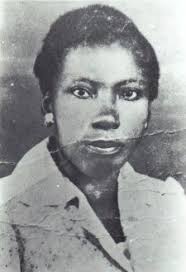Elma Francois
Elma Francois | |
|---|---|
 | |
| Born | 14 October 1897 |
| Nationality | Trinidadian |
| Occupation(s) | Human rights campaigner, political activist |
| Awards | National Heroine of Trinidad and Tobago |
Elma Francois (born in Overland, Saint Vincent and the Grenadines on October 14, 1897 – 1944) was an Africentric political activist who, on October 14, 1987, was declared as a "national heroine of Trinidad and Tobago".[1] She had been described as one of the "vociferous Africentric activists" in the history of Trinidad and Tobago and in the Caribbean region.[1]
Biography
Early life
Born in 1897, Elma Francois acquired her primary education (up to "5th Standard") while working as a cotton picker with her mother, for which the typical pay was just 12-14 cents per day. Even at a young age Francois was an activist for the betterment of her people. She tried to organise the fellow laborers at the Mt. Bentick factory for better working conditions and was fired for doing so.
She bore a son, named Conrad, in 1917, who she had to leave in the care of her own mother when she needed to migrate to Trinidad and Tobago for better opportunities.
Trinidad Workingman's Association
In Trinidad and Tobago, she worked as a domestic helper. There she joined the Trinidad Labour Party, where she found a sympathizer of the working class in the name of Captain A. A. Cipriani, a former soldier of the West India Regiment.[1]
Francois, together with Jim Headly, was a co-founding member of the so-called Negro Welfare Cultural and Social Association (NWCSA). She was a participant in the "Butler Riots" of 1937. After being captured by the police, Francois was tried for sedition, becoming the first woman in the history of Trinidad and Tobago to be tried for such. After defending herself, Francois was eventually found not guilty of the crime.[1]
Later, Francois became broken-hearted after her son Conrad joined the army to "fight in a war" that involves black people. Francois died in 1944.[1]
See also
Further reading
- Reddock, Rhoda (1988). Elma Francois: the NWCSA and the worker's struggle for change in the Caribbean. London and Port of Spain: New Beacon Books. ISBN 978-0-901241-79-5.
References
